文章目录
前言
AVFormatContext 是一个贯穿始终的数据结构,很多函数都用到它作为参数,是输入输出相关信息的一个容器,本文讲解 AVFormatContext 的编解码层,主要包括三大数据结构:AVStream,AVCodecContex,AVCodec。
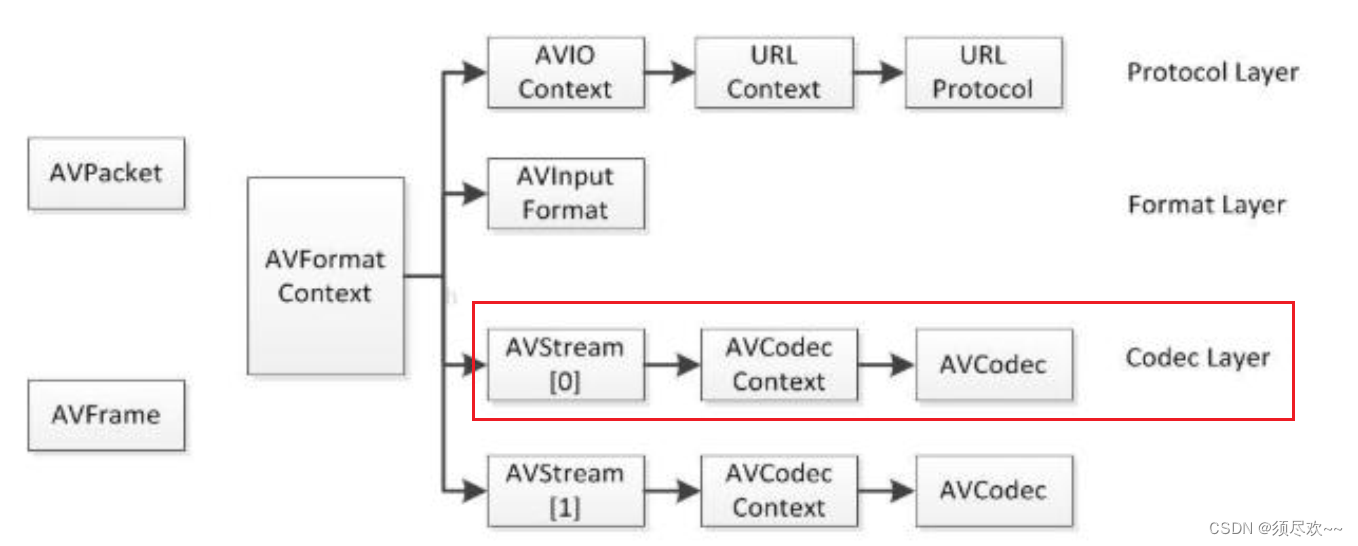
一、FFmpeg 解码流程

得到输入文件 -> 解封格式 -> 得到编码的数据包 -> 解码数据包 -> 得到解码后的数据帧 -> 处理数据帧 -> 编码 -> 得到编码后的数据包 -> 封装格式 -> 输出文件
涉及到下面的 API 函数:
- 注册所有容器格式和 CODEC:
av_register_all(); - 打开文件:
av_open_input_file(); - 从文件中提取流信息:
av_find_stream_info(); - 穷举所有的流,查找其中种类为
CODEC_TYPE_VIDEO; - 查找对应的解码器:
avcodec_find_decoder(); - 打开编解码器:
avcodec_open(); - 为解码帧分配内存:
avcodec_alloc_frame(); - 不停地从码流中提取出帧数据:
av_read_frame(); - 判断帧的类型,对于视频帧调用:
avcodec_decode_video(); - 解码完后,释放解码器:
avcodec_close(); - 关闭输入文件:
av_close_input_file();
程序流程图如下图所示:
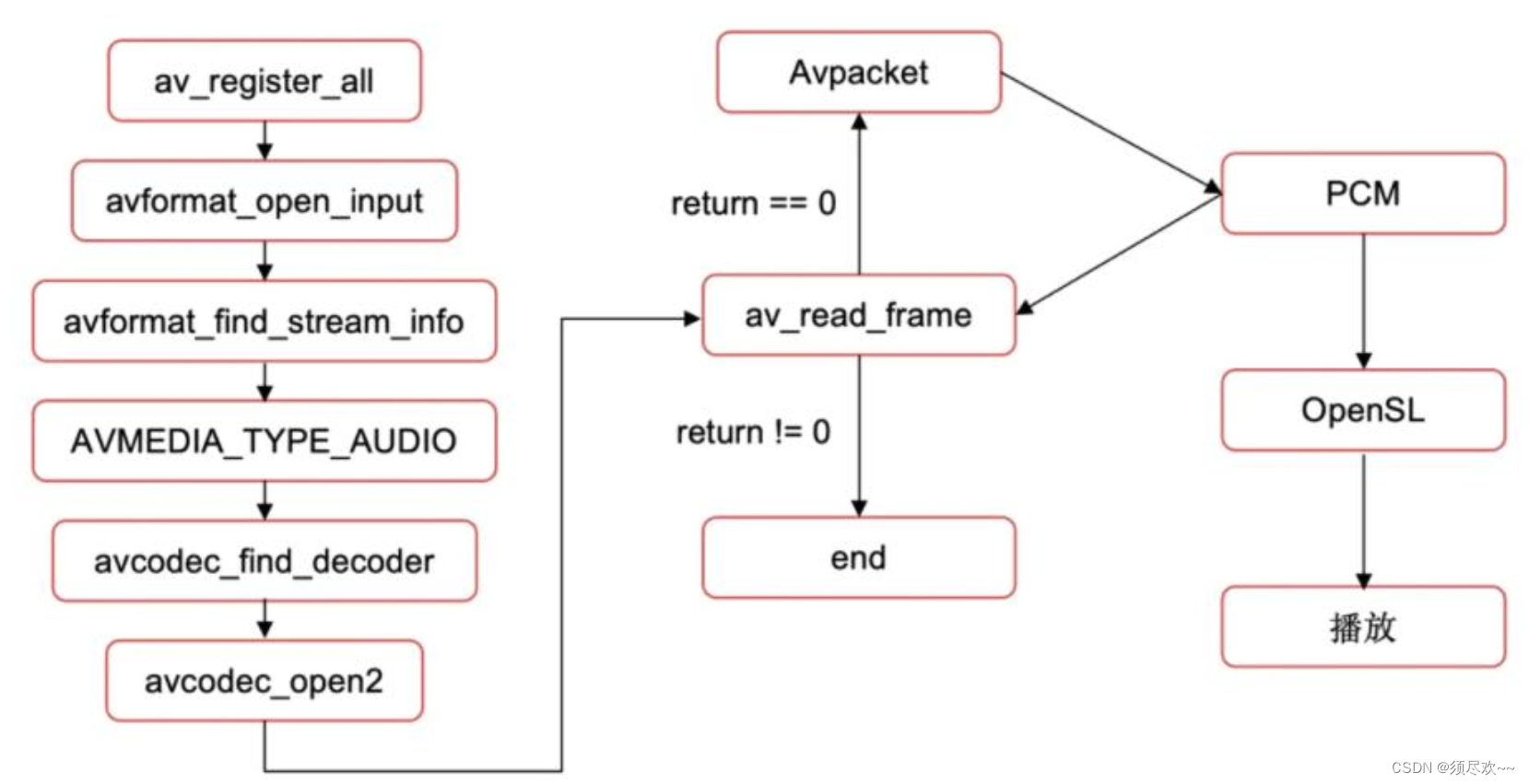
二、FFmpeg 转码流程
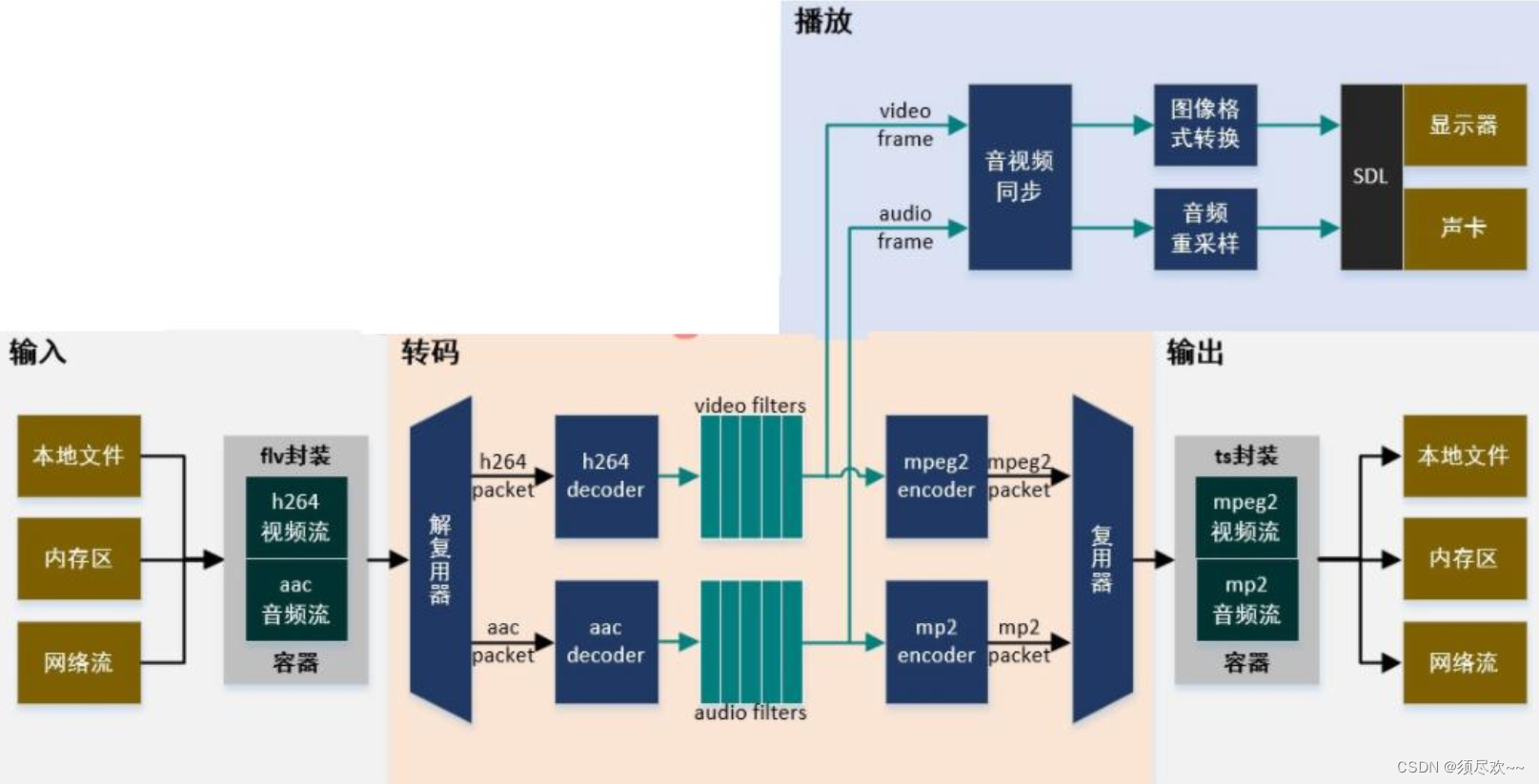
- 大流程可以划分为输入、输出、转码、播放四大块;
- 其中转码涉及比较多的处理环节,从图中可以看出,转码功能在整个功能图中占比很大。转码的核心功能在解码和编码两个部分,但在一个可用的示例程序中,编码解码与输入输出是难以分割的。
- 解复用器为解码器提供输入,解码器会输出原始帧,对原始帧可进行各种复杂的滤镜处理,滤镜处理后的帧经编码器生成编码帧,多路流的编码帧经复用器输出到输出文件。
三、编解码 API 详解
- 解码使用
avcodec_send_packet()和avcodec_receive_frame()两个函数。 - 编码使用
avcodec_send_frame()和avcodec_receive_packet()两个函数。
1、解码 API 使用详解
关于 avcodec_send_packet() 与 avcodec_receive_frame() 的使用说明:
- ①、按 dts 递增的顺序向解码器送入编码帧 packet,解码器按 pts 递增的顺序输出原始帧 frame,实际上解码器不关注输入 packet 的 dts(错值都没关系),它只管依次处理收到的 packet,按需缓冲和解码;
- ②、
avcodec_receive_frame()输出 frame 时,会根据各种因素设置好frame->best_effort_timestamp(文档明确说明),实测frame->pts也会被设置(通常直接拷贝自对应的packet.pts,文档未明确说明)用户应确保avcodec_send_packet()发送的 packet 具有正确的 pts,编码帧 packet 与原始帧 frame 间的对应关系通过 pts 确定; - ③、
avcodec_receive_frame()输 出 frame 时 ,frame->pkt_dts拷贝自当前avcodec_send_packet()发送的 packet 中的 dts, 如果当前 packet 为 NULL(flush packet),解码器进入 flush 模式,当前及剩余的frame->pkt_dts值总为AV_NOPTS_VALUE。因为解码器中有缓存帧,当前输出的 frame 并不是由当前输入的 packet 解码得到的,所以这个frame->pkt_dts没什么实际意义,可以不必关注; - ④、
avcodec_send_packet()发送第一个 NULL 会返回成功,后续的 NULL 会返回AVERROR_EOF; - ⑤、
avcodec_send_packet()多次发送 NULL 并不会导致解码器中缓存的帧丢失,使用avcodec_flush_buffers()可以立即丢掉解码器中缓存帧。因此播放完毕时应avcodec_send_packet(NULL)来取完缓存的帧,而 SEEK 操作或切换流时应调用avcodec_flush_buffers()来直接丢弃缓存帧; - ⑥、解码器通常的冲洗方法:调用一次
avcodec_send_packet(NULL)(返回成功),然后不停调用avcodec_receive_frame()直到其返回AVERROR_EOF,取出所有缓存帧,avcodec_receive_frame()返回AVERROR_EOF这一次是没有有效数据的,仅仅获取到一个结束标志;
2、编码 API 使用详解
关于 avcodec_send_frame() 与 avcodec_receive_packet() 的使用说明:
- ①、按 pts 递增的顺序向编码器送入原始帧 frame, 编码器按 dts 递增的顺序输出编码帧 packet,实际上编码器关注输入 frame 的 pts 不关注其 dts,它只管依次处理收到的 frame,按需缓冲和编码;
- ②、
avcodec_receive_packet()输出 packet 时,会设置 packet.dts,从 0 开始,每次输出的 packet 的 dts 加 1,这是视频层的 dts,用户写输出前应将其转换为容器层的 dts; - ③、
avcodec_receive_packet()输出 packet 时,packet.pts拷贝自对应的frame.pts,这是视频层的 pts,用户写输出前应将其转换为容器层的 pts; - ④、
avcodec_send_frame()发送 NULL frame 时, 编码器进入 flush 模式; - ⑤、
avcodec_send_frame()发送第一个 NULL 会返回成功 ,后续的 NULL 会返回AVERROR_EOF; - ⑥、
avcodec_send_frame()多次发送 NULL 并不会导致编码器中缓存的帧丢失,使用avcodec_flush_buffers()可以立即丢掉编码器中缓存帧。因此编码完毕时应使用avcodec_send_frame(NULL)来取完缓存的帧,而 SEEK 操作或切换流时应调用avcodec_flush_buffers()来直接丢弃缓存帧; - ⑦、编码器通常的冲洗方法:调用一次
avcodec_send_frame(NULL)(返回成功),然后不停调用avcodec_receive_packet()直到其返回AVERROR_EOF,取出所有缓存帧,avcodec_receive_packet()返回AVERROR_EOF这一次是没有有效数据的,仅仅获取到一个结束标志; - ⑧、对音频来说,如果
AV_CODEC_CAP_VARIABLE_FRAME_SIZE(在AVCodecContext.codec.capabilities变量中,只读)标志有效,表示编码器支持可变尺寸音频帧,送入编码器的音频帧可以包含任意数量的采样点。如果此标志无效,则每一个音频帧的采样点数目(frame->nb_samples)必须等于编码器设定的音频帧尺寸(avctx->frame_size),最后一帧除外,最后一帧音频帧采样点数可以小于avctx->frame_size;
四、编码案例实战
下面代码使用实现了一个简单的视频编码器,将指定的图像序列编码为 MPEG 视频文件
1、示例源码
#include <stdio.h>
#include <stdlib.h>
#include <string.h>
#include <libavcodec/avcodec.h>
#include <libavutil/opt.h>
#include <libavutil/imgutils.h>
static void encode(AVCodecContext *enc_ctx, AVFrame *frame, AVPacket *pkt,
FILE *outfile)
{
int ret;
/* send the frame to the encoder */
if (frame)
printf("Send frame %3"PRId64"\n", frame->pts);
ret = avcodec_send_frame(enc_ctx, frame);
if (ret < 0) {
fprintf(stderr, "Error sending a frame for encoding\n");
exit(1);
}
while (ret >= 0) {
ret = avcodec_receive_packet(enc_ctx, pkt);
if (ret == AVERROR(EAGAIN) || ret == AVERROR_EOF)
return;
else if (ret < 0) {
fprintf(stderr, "Error during encoding\n");
exit(1);
}
printf("Write packet %3"PRId64" (size=%5d)\n", pkt->pts, pkt->size);
fwrite(pkt->data, 1, pkt->size, outfile);
av_packet_unref(pkt);
}
}
int main(int argc, char **argv)
{
const char *filename, *codec_name;
const AVCodec *codec;
AVCodecContext *c= NULL;
int i, ret, x, y;
FILE *f;
AVFrame *frame;
AVPacket *pkt;
uint8_t endcode[] = {
0, 0, 1, 0xb7 };
filename = "./debug/test666.mp4";
codec_name = "mpeg1video";
/* find the mpeg1video encoder */
codec = avcodec_find_encoder_by_name(codec_name);
if (!codec) {
fprintf(stderr, "Codec '%s' not found\n", codec_name);
exit(1);
}
c = avcodec_alloc_context3(codec);
if (!c) {
fprintf(stderr, "Could not allocate video codec context\n");
exit(1);
}
pkt = av_packet_alloc();
if (!pkt)
exit(1);
/* put sample parameters */
c->bit_rate = 400000;
/* resolution must be a multiple of two */
c->width = 352;
c->height = 288;
/* frames per second */
c->time_base = (AVRational){
1, 25};
c->framerate = (AVRational){
25, 1};
/* emit one intra frame every ten frames
* check frame pict_type before passing frame
* to encoder, if frame->pict_type is AV_PICTURE_TYPE_I
* then gop_size is ignored and the output of encoder
* will always be I frame irrespective to gop_size
*/
c->gop_size = 10;
c->max_b_frames = 1;
c->pix_fmt = AV_PIX_FMT_YUV420P;
if (codec->id == AV_CODEC_ID_H264)
av_opt_set(c->priv_data, "preset", "slow", 0);
/* open it */
ret = avcodec_open2(c, codec, NULL);
if (ret < 0) {
fprintf(stderr, "Could not open codec: %s\n", av_err2str(ret));
exit(1);
}
f = fopen(filename, "wb");
if (!f) {
fprintf(stderr, "Could not open %s\n", filename);
exit(1);
}
frame = av_frame_alloc();
if (!frame) {
fprintf(stderr, "Could not allocate video frame\n");
exit(1);
}
frame->format = c->pix_fmt;
frame->width = c->width;
frame->height = c->height;
ret = av_frame_get_buffer(frame, 0);
if (ret < 0) {
fprintf(stderr, "Could not allocate the video frame data\n");
exit(1);
}
/* encode 1 second of video */
for (i = 0; i < 25; i++) {
fflush(stdout);
/* make sure the frame data is writable */
ret = av_frame_make_writable(frame);
if (ret < 0)
exit(1);
/* prepare a dummy image */
/* Y */
for (y = 0; y < c->height; y++) {
for (x = 0; x < c->width; x++) {
frame->data[0][y * frame->linesize[0] + x] = x + y + i * 3;
}
}
/* Cb and Cr */
for (y = 0; y < c->height/2; y++) {
for (x = 0; x < c->width/2; x++) {
frame->data[1][y * frame->linesize[1] + x] = 128 + y + i * 2;
frame->data[2][y * frame->linesize[2] + x] = 64 + x + i * 5;
}
}
frame->pts = i;
/* encode the image */
encode(c, frame, pkt, f);
}
/* flush the encoder */
encode(c, NULL, pkt, f);
/* add sequence end code to have a real MPEG file */
if (codec->id == AV_CODEC_ID_MPEG1VIDEO || codec->id == AV_CODEC_ID_MPEG2VIDEO)
fwrite(endcode, 1, sizeof(endcode), f);
fclose(f);
avcodec_free_context(&c);
av_frame_free(&frame);
av_packet_free(&pkt);
return 0;
}
2、运行结果
Send frame 0
Send frame 1
Write packet 0 (size= 6731)
Send frame 2
Write packet 2 (size= 3727)
Send frame 3
Write packet 1 (size= 1680)
Send frame 4
Write packet 4 (size= 2744)
Send frame 5
Write packet 3 (size= 1678)
Send frame 6
Write packet 6 (size= 2963)
Send frame 7
Write packet 5 (size= 1819)
Send frame 8
Write packet 8 (size= 3194)
Send frame 9
Write packet 7 (size= 1977)
Send frame 10
Write packet 10 (size=12306)
Send frame 11
Write packet 9 (size= 2231)
Send frame 12
Write packet 12 (size= 3762)
Send frame 13
Write packet 11 (size= 2039)
[mpeg1video @ 02562100] warning, clipping 1 dct coefficients to -255..255
....
[mpeg1video @ 02562100] warning, clipping 1 dct coefficients to -255..255
[mpeg1video @ 02562100] waSend frame 14
Write packet 14 (size= 3278)
Send frame 15
Write packet 13 (size= 1939)
Send frame 16
Write packet 16 (size= 3150)
Send frame 17
Write packet 15 (size= 1929)
Send frame 18
Write packet 18 (size= 3422)
Send frame 19
Write packet 17 (size= 2116)
Send frame 20
Write packet 20 (size=12236)
Send frame 21
Write packet 19 (size= 2055)
Send frame 22
Write packet 22 (size= 4054)
Send frame 23
Write packet 21 (size= 2048)
Send frame 24
Write packet 24 (size= 3191)
Write packet 23 (size= 1955)
rning, clipping 1 dct coefficients to -255..255
[mpeg1video @ 02562100] warning, clipping 1 dct coefficients to -255..255
....
[mpeg1video @ 02562100] warning, clipping 1 dct coefficients to -255..255
在 debug 目录下生成一个 test666.mp4,使用 MediaInfo 查看相关信息如下:
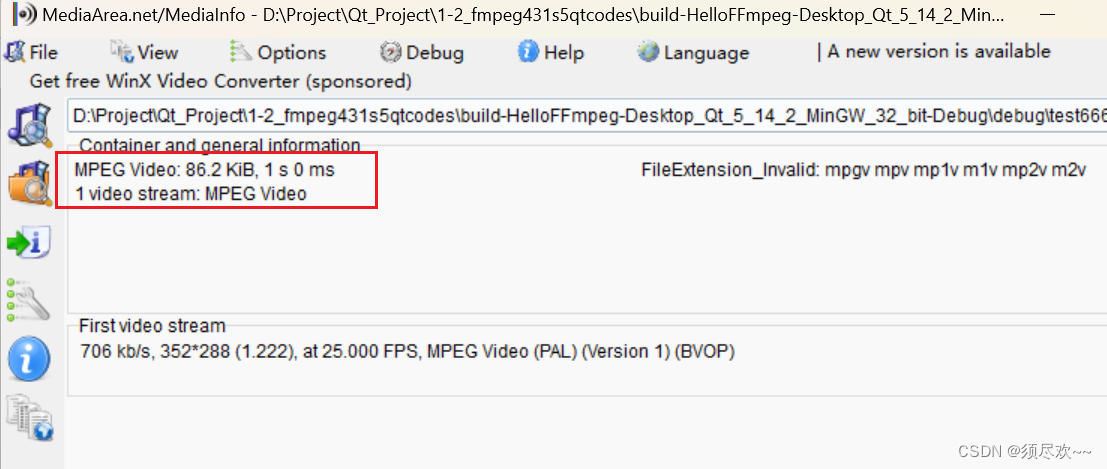
可以看到只有一路视频流。使用 VLC 播放可以看到 1s 的视频如下:
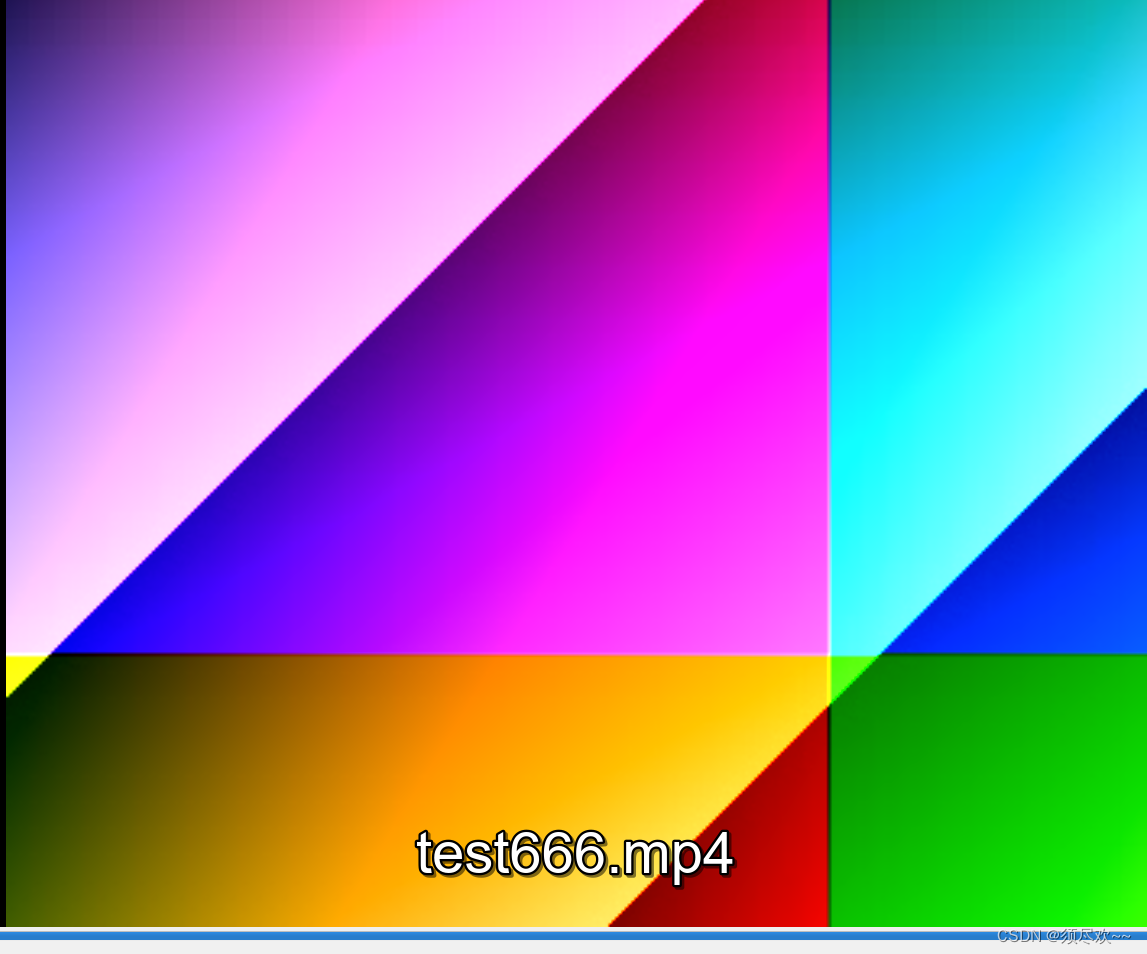
五、解码案例实战
下面代码使用实现了一个视频解码,将指定的视频 test.flv 解码为原始视频数据 yuv 和原始音频数据 pcm
1、示例源码
/**
* @file
* Demuxing and decoding example.
*
* Show how to use the libavformat and libavcodec API to demux and
* decode audio and video data.
* @example demuxing_decoding.c
*/
#include <libavutil/imgutils.h>
#include <libavutil/samplefmt.h>
#include <libavutil/timestamp.h>
#include <libavformat/avformat.h>
static AVFormatContext *fmt_ctx = NULL;
static AVCodecContext *video_dec_ctx = NULL, *audio_dec_ctx;
static int width, height;
static enum AVPixelFormat pix_fmt;
static AVStream *video_stream = NULL, *audio_stream = NULL;
static const char *src_filename = NULL;
static const char *video_dst_filename = NULL;
static const char *audio_dst_filename = NULL;
static FILE *video_dst_file = NULL;
static FILE *audio_dst_file = NULL;
static uint8_t *video_dst_data[4] = {
NULL};
static int video_dst_linesize[4];
static int video_dst_bufsize;
static int video_stream_idx = -1, audio_stream_idx = -1;
static AVFrame *frame = NULL;
static AVPacket pkt;
static int video_frame_count = 0;
static int audio_frame_count = 0;
static int output_video_frame(AVFrame *frame)
{
if (frame->width != width || frame->height != height ||
frame->format != pix_fmt) {
/* To handle this change, one could call av_image_alloc again and
* decode the following frames into another rawvideo file. */
fprintf(stderr, "Error: Width, height and pixel format have to be "
"constant in a rawvideo file, but the width, height or "
"pixel format of the input video changed:\n"
"old: width = %d, height = %d, format = %s\n"
"new: width = %d, height = %d, format = %s\n",
width, height, av_get_pix_fmt_name(pix_fmt),
frame->width, frame->height,
av_get_pix_fmt_name(frame->format));
return -1;
}
printf("video_frame n:%d coded_n:%d\n",
video_frame_count++, frame->coded_picture_number);
/* copy decoded frame to destination buffer:
* this is required since rawvideo expects non aligned data */
av_image_copy(video_dst_data, video_dst_linesize,
(const uint8_t **)(frame->data), frame->linesize,
pix_fmt, width, height);
/* write to rawvideo file */
fwrite(video_dst_data[0], 1, video_dst_bufsize, video_dst_file);
return 0;
}
static int output_audio_frame(AVFrame *frame)
{
size_t unpadded_linesize = frame->nb_samples * av_get_bytes_per_sample(frame->format);
printf("audio_frame n:%d nb_samples:%d pts:%s\n",
audio_frame_count++, frame->nb_samples,
av_ts2timestr(frame->pts, &audio_dec_ctx->time_base));
/* Write the raw audio data samples of the first plane. This works
* fine for packed formats (e.g. AV_SAMPLE_FMT_S16). However,
* most audio decoders output planar audio, which uses a separate
* plane of audio samples for each channel (e.g. AV_SAMPLE_FMT_S16P).
* In other words, this code will write only the first audio channel
* in these cases.
* You should use libswresample or libavfilter to convert the frame
* to packed data. */
fwrite(frame->extended_data[0], 1, unpadded_linesize, audio_dst_file);
return 0;
}
static int decode_packet(AVCodecContext *dec, const AVPacket *pkt)
{
int ret = 0;
// submit the packet to the decoder
ret = avcodec_send_packet(dec, pkt);
if (ret < 0) {
fprintf(stderr, "Error submitting a packet for decoding (%s)\n", av_err2str(ret));
return ret;
}
// get all the available frames from the decoder
while (ret >= 0) {
ret = avcodec_receive_frame(dec, frame);
if (ret < 0) {
// those two return values are special and mean there is no output
// frame available, but there were no errors during decoding
if (ret == AVERROR_EOF || ret == AVERROR(EAGAIN))
return 0;
fprintf(stderr, "Error during decoding (%s)\n", av_err2str(ret));
return ret;
}
// write the frame data to output file
if (dec->codec->type == AVMEDIA_TYPE_VIDEO)
ret = output_video_frame(frame);
else
ret = output_audio_frame(frame);
av_frame_unref(frame);
if (ret < 0)
return ret;
}
return 0;
}
static int open_codec_context(int *stream_idx,
AVCodecContext **dec_ctx, AVFormatContext *fmt_ctx, enum AVMediaType type)
{
int ret, stream_index;
AVStream *st;
AVCodec *dec = NULL;
AVDictionary *opts = NULL;
ret = av_find_best_stream(fmt_ctx, type, -1, -1, NULL, 0);
if (ret < 0) {
fprintf(stderr, "Could not find %s stream in input file '%s'\n",
av_get_media_type_string(type), src_filename);
return ret;
} else {
stream_index = ret;
st = fmt_ctx->streams[stream_index];
/* find decoder for the stream */
dec = avcodec_find_decoder(st->codecpar->codec_id);
if (!dec) {
fprintf(stderr, "Failed to find %s codec\n",
av_get_media_type_string(type));
return AVERROR(EINVAL);
}
/* Allocate a codec context for the decoder */
*dec_ctx = avcodec_alloc_context3(dec);
if (!*dec_ctx) {
fprintf(stderr, "Failed to allocate the %s codec context\n",
av_get_media_type_string(type));
return AVERROR(ENOMEM);
}
/* Copy codec parameters from input stream to output codec context */
if ((ret = avcodec_parameters_to_context(*dec_ctx, st->codecpar)) < 0) {
fprintf(stderr, "Failed to copy %s codec parameters to decoder context\n",
av_get_media_type_string(type));
return ret;
}
/* Init the decoders */
if ((ret = avcodec_open2(*dec_ctx, dec, &opts)) < 0) {
fprintf(stderr, "Failed to open %s codec\n",
av_get_media_type_string(type));
return ret;
}
*stream_idx = stream_index;
}
return 0;
}
static int get_format_from_sample_fmt(const char **fmt,
enum AVSampleFormat sample_fmt)
{
int i;
struct sample_fmt_entry {
enum AVSampleFormat sample_fmt; const char *fmt_be, *fmt_le;
} sample_fmt_entries[] = {
{
AV_SAMPLE_FMT_U8, "u8", "u8" },
{
AV_SAMPLE_FMT_S16, "s16be", "s16le" },
{
AV_SAMPLE_FMT_S32, "s32be", "s32le" },
{
AV_SAMPLE_FMT_FLT, "f32be", "f32le" },
{
AV_SAMPLE_FMT_DBL, "f64be", "f64le" },
};
*fmt = NULL;
for (i = 0; i < FF_ARRAY_ELEMS(sample_fmt_entries); i++) {
struct sample_fmt_entry *entry = &sample_fmt_entries[i];
if (sample_fmt == entry->sample_fmt) {
*fmt = AV_NE(entry->fmt_be, entry->fmt_le);
return 0;
}
}
fprintf(stderr,
"sample format %s is not supported as output format\n",
av_get_sample_fmt_name(sample_fmt));
return -1;
}
int main(int argc, char **argv)
{
int ret = 0;
src_filename = "./debug/test.flv";
video_dst_filename = "./debug/test.yuv";
audio_dst_filename = "./debug/test.pcm";
/* open input file, and allocate format context */
if (avformat_open_input(&fmt_ctx, src_filename, NULL, NULL) < 0) {
fprintf(stderr, "Could not open source file %s\n", src_filename);
exit(1);
}
/* retrieve stream information */
if (avformat_find_stream_info(fmt_ctx, NULL) < 0) {
fprintf(stderr, "Could not find stream information\n");
exit(1);
}
if (open_codec_context(&video_stream_idx, &video_dec_ctx, fmt_ctx, AVMEDIA_TYPE_VIDEO) >= 0) {
video_stream = fmt_ctx->streams[video_stream_idx];
video_dst_file = fopen(video_dst_filename, "wb");
if (!video_dst_file) {
fprintf(stderr, "Could not open destination file %s\n", video_dst_filename);
ret = 1;
goto end;
}
/* allocate image where the decoded image will be put */
width = video_dec_ctx->width;
height = video_dec_ctx->height;
pix_fmt = video_dec_ctx->pix_fmt;
ret = av_image_alloc(video_dst_data, video_dst_linesize,
width, height, pix_fmt, 1);
if (ret < 0) {
fprintf(stderr, "Could not allocate raw video buffer\n");
goto end;
}
video_dst_bufsize = ret;
}
if (open_codec_context(&audio_stream_idx, &audio_dec_ctx, fmt_ctx, AVMEDIA_TYPE_AUDIO) >= 0) {
audio_stream = fmt_ctx->streams[audio_stream_idx];
audio_dst_file = fopen(audio_dst_filename, "wb");
if (!audio_dst_file) {
fprintf(stderr, "Could not open destination file %s\n", audio_dst_filename);
ret = 1;
goto end;
}
}
/* dump input information to stderr */
av_dump_format(fmt_ctx, 0, src_filename, 0);
if (!audio_stream && !video_stream) {
fprintf(stderr, "Could not find audio or video stream in the input, aborting\n");
ret = 1;
goto end;
}
frame = av_frame_alloc();
if (!frame) {
fprintf(stderr, "Could not allocate frame\n");
ret = AVERROR(ENOMEM);
goto end;
}
/* initialize packet, set data to NULL, let the demuxer fill it */
av_init_packet(&pkt);
pkt.data = NULL;
pkt.size = 0;
if (video_stream)
printf("Demuxing video from file '%s' into '%s'\n", src_filename, video_dst_filename);
if (audio_stream)
printf("Demuxing audio from file '%s' into '%s'\n", src_filename, audio_dst_filename);
/* read frames from the file */
while (av_read_frame(fmt_ctx, &pkt) >= 0) {
// check if the packet belongs to a stream we are interested in, otherwise
// skip it
if (pkt.stream_index == video_stream_idx)
ret = decode_packet(video_dec_ctx, &pkt);
else if (pkt.stream_index == audio_stream_idx)
ret = decode_packet(audio_dec_ctx, &pkt);
av_packet_unref(&pkt);
if (ret < 0)
break;
}
/* flush the decoders */
if (video_dec_ctx)
decode_packet(video_dec_ctx, NULL);
if (audio_dec_ctx)
decode_packet(audio_dec_ctx, NULL);
printf("Demuxing succeeded.\n");
if (video_stream) {
printf("Play the output video file with the command:\n"
"ffplay -f rawvideo -pix_fmt %s -video_size %dx%d %s\n",
av_get_pix_fmt_name(pix_fmt), width, height,
video_dst_filename);
}
if (audio_stream) {
enum AVSampleFormat sfmt = audio_dec_ctx->sample_fmt;
int n_channels = audio_dec_ctx->channels;
const char *fmt;
if (av_sample_fmt_is_planar(sfmt)) {
const char *packed = av_get_sample_fmt_name(sfmt);
printf("Warning: the sample format the decoder produced is planar "
"(%s). This example will output the first channel only.\n",
packed ? packed : "?");
sfmt = av_get_packed_sample_fmt(sfmt);
n_channels = 1;
}
if ((ret = get_format_from_sample_fmt(&fmt, sfmt)) < 0)
goto end;
printf("Play the output audio file with the command:\n"
"ffplay -f %s -ac %d -ar %d %s\n",
fmt, n_channels, audio_dec_ctx->sample_rate,
audio_dst_filename);
}
end:
avcodec_free_context(&video_dec_ctx);
avcodec_free_context(&audio_dec_ctx);
avformat_close_input(&fmt_ctx);
if (video_dst_file)
fclose(video_dst_file);
if (audio_dst_file)
fclose(audio_dst_file);
av_frame_free(&frame);
av_free(video_dst_data[0]);
return ret < 0;
}
2、运行结果
Demuxing video from file './debug/test.flv' into './debug/test.yuv'
Demuxing audio from file './debug/test.flv' into './debug/test.pcm'
video_frame n:0 coded_n:0
audio_frame n:0 nb_samples:1024 pts:0
audio_frame n:1 nb_samples:1024 pts:0.0004375
video_frame n:1 coded_n:1
audio_frame n:2 nb_samples:1024 pts:0.000895833
audio_frame n:3 nb_samples:1024 pts:0.00133333
video_frame n:2 coded_n:2
audio_frame n:4 nb_samples:1024 pts:0.00177083
audio_frame n:5 nb_samples:1024 pts:0.00222917
....
video_frame n:2931 coded_n:2931
audio_frame n:5496 nb_samples:1024 pts:2.44267
audio_frame n:5497 nb_samples:1024 pts:2.4431
audio_frame n:5498 nb_samples:1024 pts:2.44356
Demuxing succeeded.
Play the output video file with the command:
ffplay -f rawvideo -pix_fmt yuv420p -video_size 1280x720 ./debug/test.yuv
Warning: the sample format the decoder produced is planar (fltp). This example will output the first channel only.
Play the output audio file with the command:
ffplay -f f32le -ac 1 -ar 48000 ./debug/test.pcm
Input #0, flv, from './debug/test.flv':
Metadata:
encoder : Lavf58.45.100
Duration: 00:01:57.31, start: 0.000000, bitrate: 1442 kb/s
Stream #0:0: Video: h264 (Main), yuv420p(progressive), 1280x720 [SAR 1:1 DAR 16:9], 1048 kb/s, 25 fps, 25 tbr, 1k tbn, 50 tbc
Stream #0:1: Audio: aac (LC), 48000 Hz, 5.1, fltp, 383 kb/s
在 debug 目录下生成了原始视频数据 test.yuv 以及原始音频数据 test.pcm

在 debug 目录下打开终端使用 ffplay 播放 test.yuv:
ffplay -f rawvideo -video_size 1280x720 test.yuv
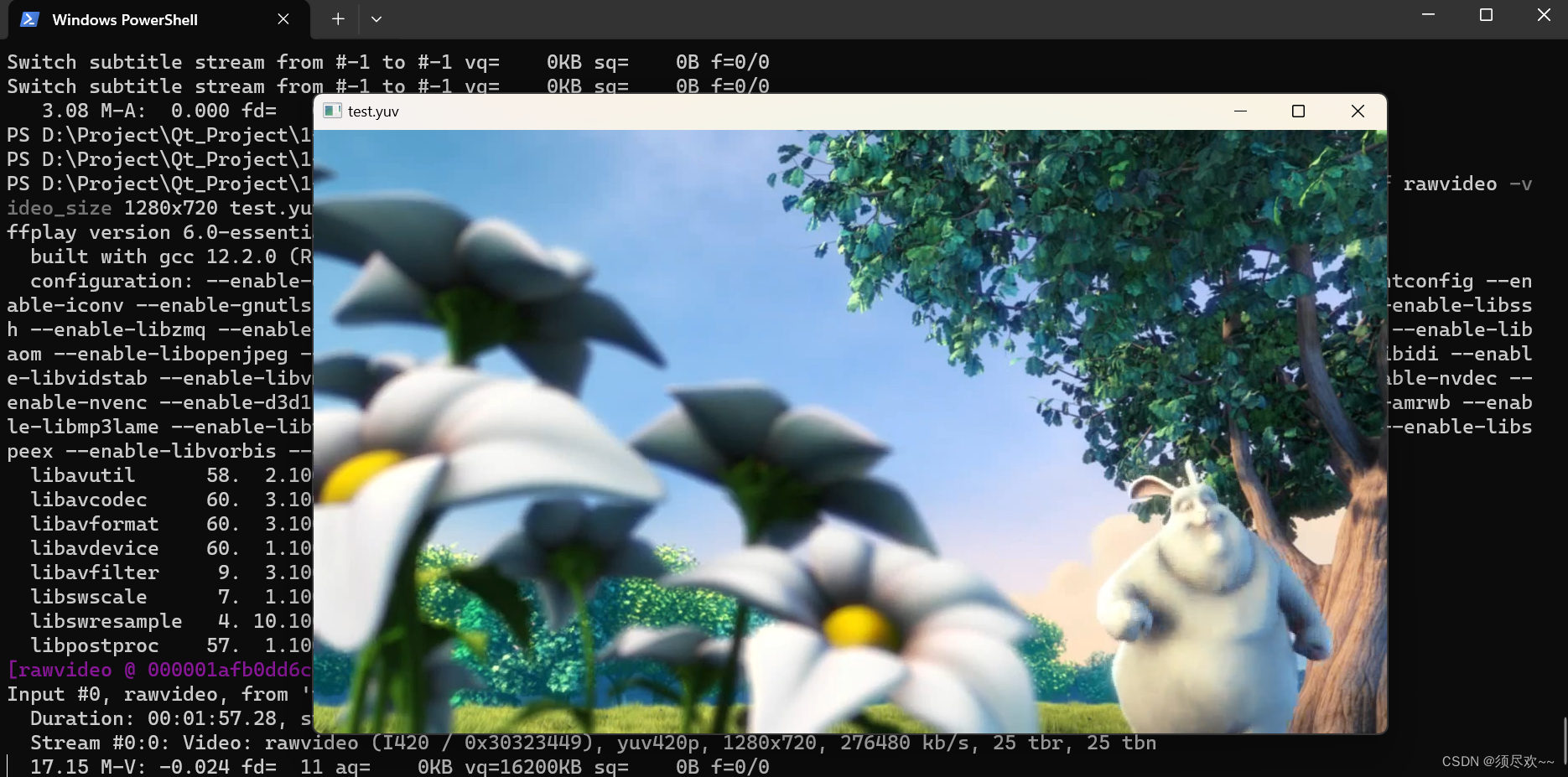
此时可以看到原视频中的视频(无音频)。
在 debug 目录下打开终端使用 ffplay 播放 test.pcm:
ffplay -f f32le -ac 1 -ar 48000 test.pcm
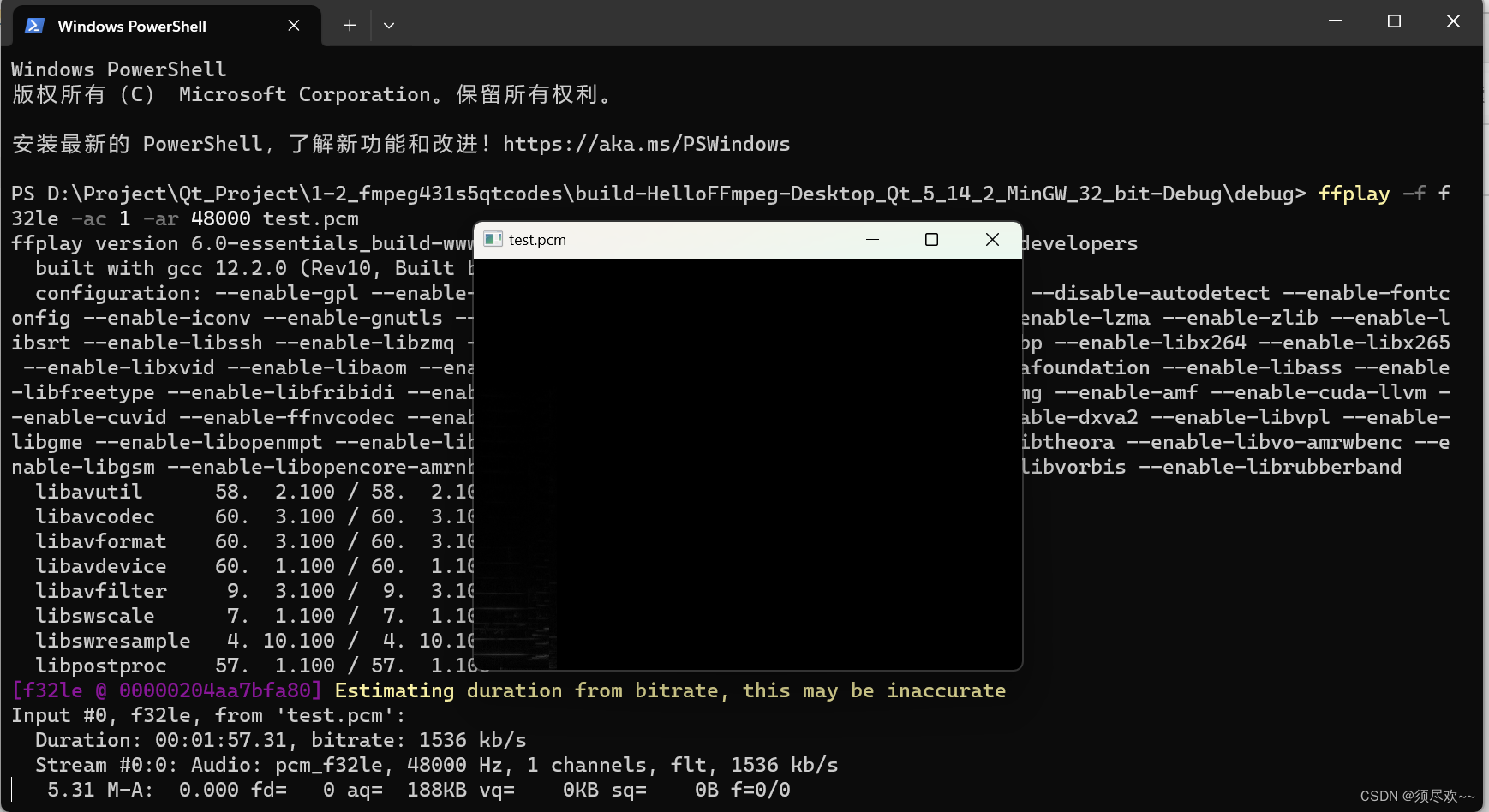
此时可以听到原视频中的音频(无视频)。
我的qq:2442391036,欢迎交流!